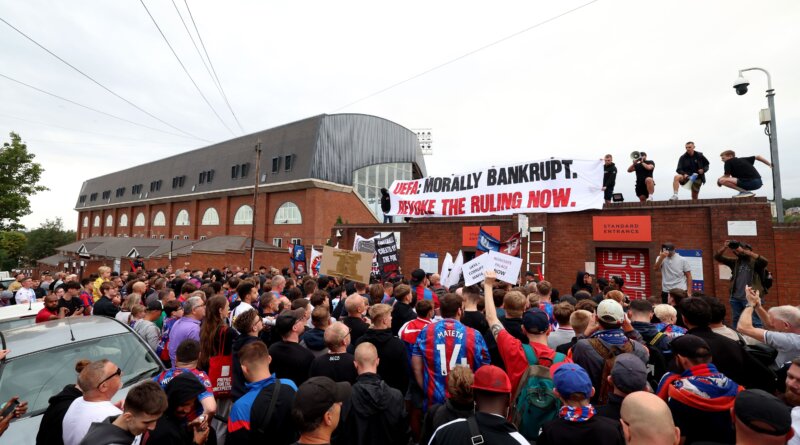Palace & UEFA Clash: Eagles Robbed of UEL
The Crystal Palace UEFA dispute has ignited a firestorm of controversy across English football, leaving the club and its supporters feeling betrayed and disenfranchised. After a glorious FA Cup triumph, a victory that should have guaranteed a coveted spot in the UEFA Europa League, the South London club has been unceremoniously demoted to the tertiary UEFA Europa Conference League. This decision, handed down by European football’s governing body, stems from the increasingly complex and contentious regulations surrounding multi-club ownership (MCO), a ruling that has left fans branding UEFA as “morally bankrupt.” The sense of injustice is palpable at Selhurst Park, where a season’s pinnacle achievement has been soured by a boardroom technicality that prioritizes ownership structures over on-pitch success.
## The Heart of the Crystal Palace UEFA Controversy
The core of the issue lies with UEFA’s Article 5 regulations, designed to protect the integrity of its competitions. These rules explicitly prohibit two clubs that share the same majority owner or decisive influence from competing in the same tournament. In this case, the conflict arises from Crystal Palace’s connection to Eagle Football Holdings, the investment vehicle led by American businessman John Textor. Eagle Football also holds a controlling stake in French club Olympique Lyonnais (Lyon). As fate would have it, Lyon also secured a place in the 2024/25 Europa League through their performance in Ligue 1.
When such a conflict occurs, UEFA’s rules dictate a clear hierarchy. The spot is awarded to the club that achieved a higher league position in its respective domestic championship. Lyon, despite a turbulent season, finished higher in the French top flight than Crystal Palace did in the Premier League. Consequently, under UEFA’s rigid framework, Palace’s FA Cup victory became secondary. The automatic Europa League qualification that comes with winning one of England’s most prestigious trophies was effectively nullified, and the Eagles were shunted down to the Conference League as a result. This technicality has overshadowed what should have been a moment of pure celebration for the club.
### A Deeper Look at Multi-Club Ownership (MCO)
The MCO model, where a single entity or individual owns stakes in multiple football clubs, has exploded in popularity over the past decade. Proponents argue it creates synergies, streamlines scouting networks, facilitates player development pathways, and offers financial stability. John Textor’s Eagle Football Holdings is a prime example, with a portfolio that also includes Botafogo in Brazil and RWD Molenbeek in Belgium, alongside Palace and Lyon.
However, governing bodies like UEFA view this trend with increasing caution. The primary concern is sporting integrity. The potential for a conflict of interest is immense. Questions arise:
* Could a parent company instruct one of its clubs to lose a match to benefit another in the same group?
* Would transfer dealings between two sister clubs be conducted at fair market value?
* Could strategic decisions be made to favour one team’s European progression over another’s?
To prevent these scenarios, UEFA implemented its strict MCO regulations. While the intention to maintain a level playing field is laudable, the Crystal Palace case highlights a significant and painful side effect. It punishes a club, its players, and its fans for a situation related to investment structures, completely detached from their performance on the field.
## Fan Fury Erupts: “A Betrayal of Football”
The reaction from the Crystal Palace fanbase has been one of raw anger and disbelief. Banners appeared outside Selhurst Park lambasting UEFA’s decision, with supporters’ groups releasing scathing statements. The phrase “morally bankrupt” has been widely used to describe an organization that fans believe has lost touch with the sport’s core principles. For them, winning the FA Cup is a monumental achievement, a dream realised through passion, effort, and skill. To have that prize diminished by a rule concerning a part-owner’s other business interests feels like a profound betrayal.
The outrage is compounded by the context of Lyon’s season. The French club endured a dreadful start and was even facing the threat of relegation before a remarkable turnaround saw them secure their European spot. To many Palace fans, it seems deeply unfair that a team that struggled so much domestically is prioritised over a team that won a major national knockout competition. This sentiment has been echoed across social media, with fans from rival clubs expressing sympathy and criticising a system that creates such a perverse outcome. The ruling has inadvertently devalued the FA Cup, suggesting its reward is conditional and subject to boardroom politics. For a full breakdown of the upcoming season’s fixtures and for more news, visit our homepage.
## What Does This Mean for Crystal Palace’s Future?
The demotion from the Europa League to the Conference League carries significant consequences for Crystal Palace, extending beyond just hurt pride.
Financial Implications
There is a substantial financial disparity between the two competitions. The prize money, television revenue, and gate receipts associated with the
Your global gateway to nonstop football coverage:
News Goal
Share this content:

